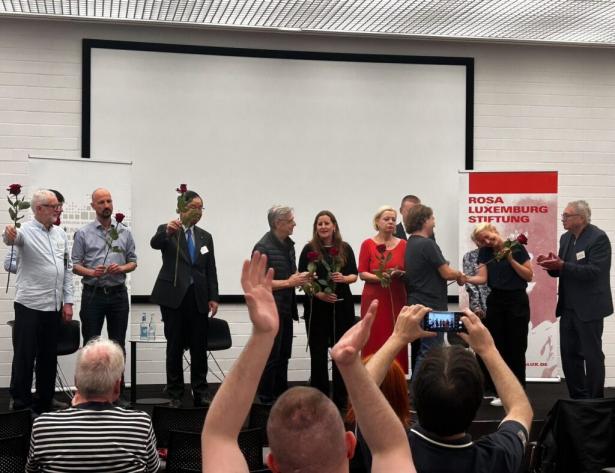This weekend in Berlin a group of left personalities published a ‘Plea for Peace in Ukraine [see text below]. Among the signatories were politicians and activists from different corners of the world who had come together for the Rosa-Luxemburg-Stiftung ‘Diplomacy Now!’ conference. Among them were Linke co-chair Janine Wissler, the ex-head of the UK’s Labour Party Jeremy Corbyn, the Italian left politician Luciana Castellina, Mónica Valente of Brazil’s Workers’ Party, and Kazuo Shii of the Communist Party of Japan. Their demand: Western governments need to ‘invest in diplomacy, not in weapons’.
The left representatives from more than ten countries spent the greater part of the conference days exchanging ideas about already existing diplomacy initiatives from Brazil, India, China, and South Africa. Ines Schwerdtner, the conference’s moderator, told Neues Deutschland that this was the first time a left exchange dedicated to this topic has occurred.
In the morning session, the Ukrainian peace activist and conscientious objector Yurii Sheliazhenko and the Russian politician Yevgeny Stupin offered the participants some perspectives on a possible peace resolution after the Russian war of aggression.
At the end of the conference, Heinz Bierbaum, the director of the Rosa-Luxemburg-Stiftung, and Luciana Castellina read out the jointly established peace appeal in German and English: ‘We stand by the Ukrainian population and all victims of this war who deserve peace, reconstruction, and freedom as soon as possible.’ ‘However, it is clear that without diplomatic negotiations nothing is achievable. Therefore civil society and the international community must make all efforts to pave the way for a ceasefire to be followed by negotiations for a “lasting peace”.’
Instead of focusing on which ‘weapon should be sent to Ukraine next’, participants said the left should develop strategies for how European and western governments could contribute to making peace negotiations possible. This requires ‘taking up the diplomatic initiatives from China, Brazil, and African and other countries to move the warring parties to end the war.’
Despite diverse positions within the left on the question of Ukraine, the signatories believe that a common position is possible: ‘a common appeal for negotiations and pressure on the western governments to invest not in weapons but in diplomacy.’
Apparently, there were different views on the question of weapons deliveries even among conference participants. In the English version of the appeal, the wording is: ‘not only in weapons, but also in diplomacy’ instead of ‘not in weapons but in diplomacy’. However, according to Heinz Bierbaum, the German version without ‘only’ is the final version.
Originally published in German at «nd – aktuell».
Diplomacy Now!
A Plea for Peace in Ukraine
31st August 2024, Berlin
Rosa Luxemburg Foundation & International Peace Bureau
We – political activists, intellectuals and citizens – who have signed this plea for a coherent, universal and international diplomatic initiative for peace in Europe and the world are convinced of the following:
The bloodshed and destruction in Ukraine must end. We stand with the people of Ukraine and all victims of this war, who deserve peace, reconstruction and freedom as soon as possible. Nevertheless, one thing is clear: neither peace nor reconstruction and freedom will be possible without negotiations. Only 20 percent of all inter-state wars end in clear victory or defeat, and even then, often only after many years. Civil society and the international community must therefore make every effort to pave the way for armistice, followed by talks for a lasting peace.
Even if negotiations ended early on during the war and even if, ever since, neither the Russian nor the Ukrainian government have shown their willingness to negotiate beyond prisoner exchanges, the export of agricultural produce and the like, an end to the violence and negotiations for peace can also be brokered. It is not enough to wait for the governments in Kyiv and Moscow to come to the table on their own or for the fatigue of those caught in this bloody war of attrition to force them to do so. We here in Germany, Europe, and the West are tired of only discussing which “game-changing” weapons to deliver next — we want to develop ways of how Western governments can help to actually facilitate peace talks.
It is important to take up the diplomatic initiatives from China, Brazil, the African and other countries in order to move the warring parties towards an end to war. We must push Western governments, which are currently more preoccupied with paving the way for a new bloc confrontation with China and Russia instead of demonstrating genuine solidarity with people in Ukraine.
As we all know, perspectives on the current war vary considerably across the international left. Nevertheless, we believe that a common position is possible: a united appeal for negotiations and pressure on our governments to invest not in weapons but in diplomacy — because what is at stake is peace, freedom, countless lives and also the democratic prospects of Ukraine and Russia. We must take up the question of how to ensure peace and security in Europe without further rearmament and a new militarist Cold War mentality. In the interest of addressing humanity’s great historic challenges – social justice, climate change, and democratic participation – we must act today and prevent a new bloc confrontation. Ending the war in Ukraine and creating peace is the starting point for this.
Pauline Jäckels studied political science, economics, and international relations in Berlin and London. After working for a Member of the German Bundestag, she joined «nd» in 2023, where she has been responsible for parliamentary reporting since. In addition, she volunteers for the magazine dis:orient.
transform! europe is a network of 38 European organisations from 22 countries, active in the field of political education and critical scientific analysis, and is the recognised political foundation corresponding to the Party of the European Left (EL).
This cooperative project of independent non-profit organisations, institutes, foundations, and individuals intends to use its work in contributing to peaceful relations among peoples and a transformation of the present world.


Spread the word